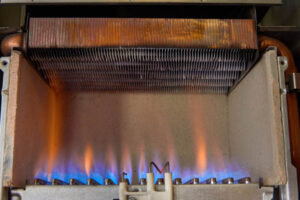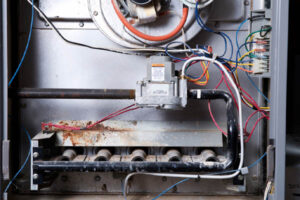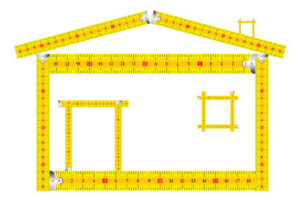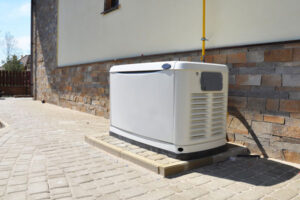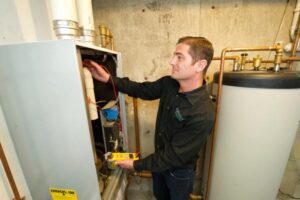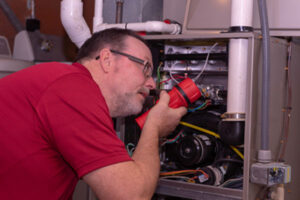Recognizing And Addressing Overcharged AC Symptoms

Contents
Many believe that having more typically means better outcomes; however, air conditioning systems are different, where achieving the correct balance is critical. Too much refrigerant in your A/C unit can be just as detrimental as too little, potentially leading to serious damage if not appropriately managed. Keeping these systems operating within ideal conditions is vital to prevent issues and extend their lifespan. Keep reading this article from Columbus Energies to learn how to identify overcharged AC symptoms and the importance of rectifying this condition promptly.
Identifying Overcharged AC Symptoms

Refrigerant is essential in any cooling system. It is tasked with pulling heat from the home’s interior and methodically decreasing the indoor temperature through ongoing cycles. While one might assume adding extra refrigerant could enhance cooling efficiency, filling the system beyond the capacity designed for the air conditioner can have harmful effects.
Handling refrigerant demands the skill and attention of a certified, experienced HVAC technician because of its potentially dangerous properties. However, mistakes in refrigerant charging by less experienced technicians can occur frequently. For homeowners, knowing what symptoms to look for is crucial. Below are the common signs of an overcharged air conditioning system:
1. Rising Energy Bills
As a homeowner, you likely know your air conditioner’s usual energy usage and associated costs well. Minor variations in this pattern are expected, but a noticeable spike in your energy bills can signal a problem with your cooling system. This is especially concerning if the cost rise comes after recent maintenance or modifications to your system. Checking if your unit may have been overcharged is prudent in such instances.
2. Elevated Heat Output
Regular HVAC system maintenance is essential, such as clearing vegetation around the outdoor unit to maintain proper airflow. During these maintenance activities, take note of the heat being expelled. It’s normal for the unit to release warm air, but if the air is scorching, it may suggest that the system is overloaded. Typical reasons for this might be clogged air filters, obstructed blowers, or too much refrigerant in the system.
3. Reduced Humidity Regulation

An air conditioner must have the correct amount of refrigerant to effectively remove moisture from the air. An overcharged system, however, struggles with humidity control, making the indoor environment uncomfortably sticky or clammy. This reduction in dehumidifying ability affects comfort levels and can lead to additional problems, such as mold growth.
4. Icy Air Conditioner Coils
An air conditioner can cool to an extreme degree, causing the coils to freeze, requiring a professional evaluation to resolve the issue. It might appear paradoxical, but too little or too much refrigerant can form ice on the coils. Determining the actual reason behind this freezing demands the knowledge of a certified technician.
5. Increased Air Conditioner Compressor Noise
A compressor in an air conditioner will naturally make some noise, and homeowners generally recognize the usual sounds it produces during startup and operation. Yet, if the compressor begins to make atypical noises, such as noticeable squealing, this indicates a problem. Such sounds frequently arise when the system is under strain from handling too much high-pressure liquid refrigerant.
6. Sudden Cooling System Shutdown
Cooling systems have safety features like shutdown switches designed to prevent damage by stopping the system abruptly under hazardous conditions. An excess of refrigerant could trigger these protective measures. If your air conditioning system unexpectedly turns off, it’s wise to seek a professional HVAC technician’s evaluation before attempting to restart it to ensure the underlying problem is resolved correctly.
7. Unstable Air Conditioner Pressure
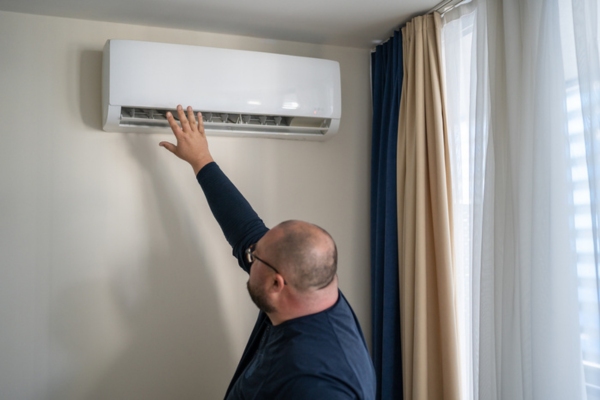
Excessive refrigerant in your air conditioning system can cause pressure levels to fluctuate unpredictably, signaling an overcharged unit. Many homeowners might need the tools to gauge these pressure changes accurately. If you’re concerned that variable pressure is compromising your system’s performance, it’s crucial to have a technician perform a professional evaluation. Such an assessment ensures an accurate and precise diagnosis of the problem.
Whether it’s installation, repair, or maintenance, Columbus Energies has you covered. Call us now for expert HVAC services!
Causes of Excessive Refrigerant in Air Conditioners

When your air conditioner has low refrigerant levels, it’s often due to leaks that gradually diminish the system’s coolant. Sealing these leaks and recharging the system can restore its efficiency. On the other hand, excessive refrigerant usually results from specific problems:
- Faulty Air Conditioner Installation: Errors during installation can lead to too much refrigerant. Hiring experienced professionals for installation is crucial to ensure that the system operates effectively and has a long lifespan. An error such as overfilling the refrigerant during setup can lead to persistent problems.
- Unqualified AC Repairs: Some homeowners might opt for repairs from unqualified services to cut costs. Such decisions can backfire, resulting in poor outcomes due to the repairers’ lack of skill, and might even cause the system to be overcharged during attempts to fix leaks. It is mandatory by law that only licensed professionals handle and dispose of refrigerant.
Experience reliable and hassle-free cooling system services. Contact Columbus Energies for all your air conditioning needs.
Impacts of an Overcharged Air Conditioning System
Having too much refrigerant in your air conditioning unit can create several issues, including:
Decreased Air Conditioner Performance & Efficiency

An overcharged system may reduce cooling effectiveness, which can be particularly frustrating during the summer when you rely heavily on indoor cooling. Furthermore, the system will have difficulty with the refrigerant’s phase change process, transitioning from gas to liquid and vice versa. This inefficiency can significantly reduce performance until the issue is addressed correctly.
Damage to Air Conditioning Valves & Connecting Rods
Overcharging the air conditioning system can lead to liquid refrigerant entering the compressor’s cylinders, which are not built to handle liquids. This inappropriate presence of liquid can cause the valves and connecting rods within the system to suffer damage, as they are designed only to handle gaseous refrigerant. Make sure you have these issues addressed by certified HVAC technicians immediately to avoid more extensive damage.
Keep your air conditioning system in peak condition with regular maintenance plans tailored to your needs by Columbus Energies. Call us today!
Cooling System Compressor Motor Burnout from Overcharging
Overcharging an air conditioner can lead to liquid refrigerant leaking into the crankcase, contaminating the oil and increasing crankcase pressure. This excess pressure overburdens the compressor motor, potentially causing burnout and failure. Often, such severe damage necessitates replacing the entire cooling system because the motor becomes irreparably damaged.
FAQs on Overcharged Air Conditioners

Below are some common questions regarding overcharged AC units:
How do I know if my air conditioner has too much refrigerant?
You can identify an overcharged air conditioner by several signs: sharp increases in energy costs, strange sounds from the compressor, sudden system shutdowns, ice on the coils, and uneven cooling performance. Observing any of these indicators suggests it’s time to contact a certified HVAC technician.
What should I do if I think my air conditioner is overcharged?
Avoid trying to resolve an overcharged air conditioner on your own. Due to its hazardous nature, handling refrigerant safely requires specific skills and certifications. Instead, contact a licensed HVAC professional who can safely assess and correct the issue.
Can overcharging my air conditioner cause long-term damage?
Yes, overcharging your air conditioner can cause long-term damage. It can harm vital components such as the compressor and significantly reduce the system’s efficiency and lifespan. Maintain the correct refrigerant level to preserve your AC’s health and performance.
Conclusion
Do not skimp on air conditioner installations and repairs. Choosing amateur services may seem cost-effective initially, but their limited expertise can cause problems, such as overcharging the system, which typically necessitates professional repairs later. The best approach is to hire certified technicians right from the start. This ensures smooth operation and helps prolong the lifespan of your cooling system, avoiding costly issues in the future.
Contact Columbus Energies for Expert HVAC Services
At Columbus Energies, we proudly provide superior heating and cooling services throughout Southeastern Massachusetts and the Rhode Island region. Our team comprises expertly trained and professionally certified technicians committed to delivering exceptional HVAC maintenance, repair, installation, and system replacement. With extensive knowledge and experience, our professionals ensure that your system functions seamlessly.
Columbus Energies offers competitive pricing for our heating and cooling services, ensuring affordability across the region. Our detailed maintenance programs are designed to improve comfort and energy efficiency while minimizing heating and cooling expenses. Whether you need a repair or are considering a new HVAC system, we’re ready to help you find the perfect solution that aligns with your needs and budget. We guarantee your satisfaction with our services. For stress-free assistance and free in-home estimates, contact Columbus Energies today to schedule your consultation.
At Columbus Energies, we stand behind our work with a solid satisfaction guarantee. For a free, in-home estimate or to schedule your service appointment, don’t hesitate to call Columbus Energies today.
Contact us now by calling (508) 674-1492 to speak to one of our home comfort specialists!

Related Articles:
- How Do I Know If My Air Conditioner Has A Refrigerant Leak?
- Decoding HVAC: Understanding The AC Condenser Vs. Evaporator Coil
- Practical Techniques for Maintaining Mold-Free Air Conditioners
- Maximize Your Comfort: Discover the Zone Potential of Mini-Splits
- Top 7 Things You Should Never Do To Your AC Unit

